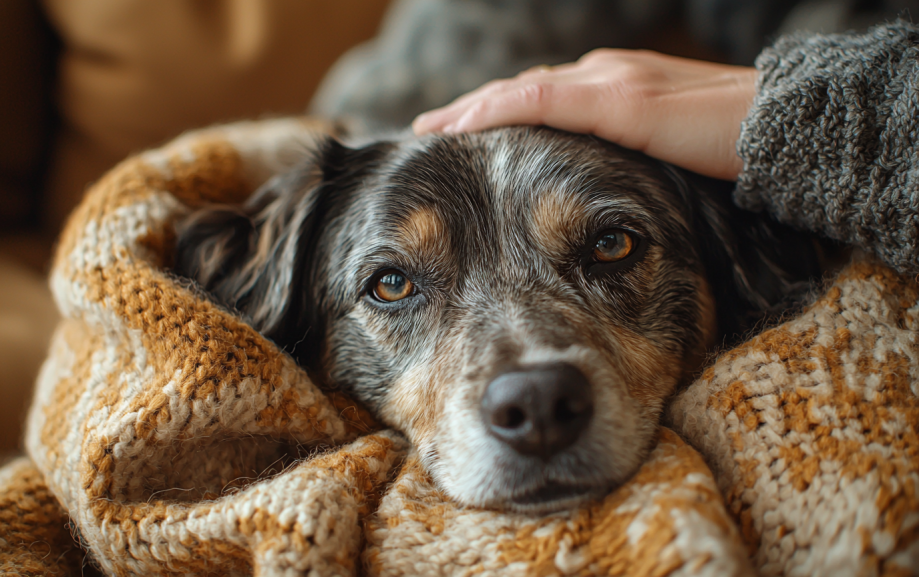1. Skin Problems in Dogs
Common Skin Issues
Skin issues are among the most common health issues in dogs. Common skin conditions include:
- Allergies: Dogs skin allergies can be due to environmental factors like pollen, mold, or dust mites. They may also react to food or flea bites.
- Hot Spots: These are red, irritated areas of the skin that become inflamed and infected, often due to excessive licking or scratching.
- Dry Skin: This can lead to flaking, itching, and discomfort. It may be a result of poor nutrition or environmental conditions.
- Fungal and Bacterial Infections: Skin infections caused by bacteria or fungi can cause itchiness, redness, and hair loss.
- Parasites: Fleas, ticks, and mites can irritate the skin, leading to scratching and potential infections.
Causes of Skin Problems
Skin problems can have various causes, such as:
- Allergens: Environmental or food-based allergies often trigger skin reactions.
- Parasites: Fleas, ticks, and mites cause irritation and inflammation.
- Poor Grooming: Lack of grooming can result in matted fur and skin infections.
- Underlying Health Conditions: Hormonal imbalances or autoimmune diseases can manifest in skin problems.
How to Treat and Prevent Skin Conditions
Treatment depends on the cause. For allergies, eliminating the allergen is key. Flea control is essential to prevent infestations. Proper grooming, regular baths, and good nutrition can keep your dog’s skin healthy. In cases of infection, your vet may prescribe antibiotics or antifungal medications. For dry skin, omega-3 supplements or moisturizing shampoos can help.
READ ALSO:
2. Digestive Issues in Dogs
Common Digestive Problems
Digestive problems can be distressing for both dogs and their owners. The most common issues include:
- Vomiting and Diarrhea: Often caused by eating something toxic, changes in diet, or infections.
- Constipation: A lack of fiber, dehydration, or ingestion of indigestible objects can lead to constipation.
- Bloating: Also known as gastric dilation volvulus (GDV), this is a life-threatening condition where the stomach fills with gas and twists.
- Flatulence: Excessive gas is often due to diet, poor digestion, or food intolerances.
Causes of Digestive Issues
Digestive problems can be triggered by:
- Dietary Indiscretion: Dogs often eat things they shouldn’t, leading to upset stomachs.
- Food Intolerances or Allergies: Some dogs are sensitive to specific ingredients.
- Infections: Bacterial, viral, or parasitic infections can wreak havoc on a dog’s digestive system.
- Stress: Anxiety or changes in routine can also cause digestive upset.
Remedies for Digestive Health
For minor digestive issues like occasional vomiting or diarrhea, withholding food for 12-24 hours and providing small amounts of water can help reset the system. A bland diet of boiled chicken and rice is often recommended after that. For chronic problems, consult your vet. They may suggest a special diet, probiotics, or medication to soothe the digestive tract. For bloating, emergency medical attention is crucial, as GDV can be fatal.
3. Joint and Bone Problems

Signs of Joint and Bone Issues
Joint and bone issues are more common in older dogs but can affect dogs of any age. Watch for:
- Limping or Stiffness: Difficulty moving, especially after rest.
- Reluctance to Exercise: Dogs with joint pain may avoid walking or playing.
- Swollen Joints: Inflammation around the joints.
- Pain When Touched: Dogs may react when you touch affected areas.
Causes of Joint Problems
- Arthritis: This degenerative joint disease is common in older dogs and larger breeds.
- Hip Dysplasia: A genetic condition where the hip joint doesn’t fit properly, leading to arthritis.
- Injuries: Fractures, sprains, or dislocations can result in long-term joint issues.
Managing and Treating Joint Conditions
Maintaining a healthy weight can relieve stress on the joints. Supplements like glucosamine and chondroitin may help with joint repair and pain relief. Low-impact exercises such as swimming or walking on soft surfaces can strengthen muscles without stressing the joints. Your vet may recommend anti-inflammatory medications or physical therapy for severe cases.
4. Dental Health Issues
Common Dental Problems in Dogs
Just like humans, dogs are prone to dental issues, including:
- Gum Disease (Periodontal Disease): Plaque and tartar buildup can lead to infection, tooth loss, and systemic health problems.
- Tooth Decay: Cavities or broken teeth can cause pain and infection.
- Bad Breath (Halitosis): Often a sign of underlying dental or health issues.
Causes of Dental Disease
Poor dental hygiene is the primary cause of most dental problems. Bacteria in the mouth form plaque, which hardens into tartar if not removed. Over time, this can lead to gum disease, tooth loss, and even heart or kidney problems if the bacteria enter the bloodstream.
Dental Care Tips and Prevention
Daily brushing with a dog-friendly toothpaste is the best way to prevent dental issues. Dental chews, toys, and regular veterinary cleanings can also help maintain good oral hygiene. If your dog shows signs of dental pain (difficulty chewing, pawing at the mouth), schedule a vet visit to rule out infections or decay.
5. Ear Infections
Signs of Ear Infections
Dogs ear infections can be painful and uncomfortable. Symptoms include:
- Shaking Head: Frequent head shaking or tilting.
- Scratching Ears: Excessive scratching or pawing at the ears.
- Odor: A strong smell coming from the ears.
- Discharge: Dark or yellowish discharge from the ear.
Causes and Risk Factors
- Moisture: Water trapped in the ears, particularly in dogs with floppy ears, can lead to infections.
- Allergies: Environmental or food allergies can cause inflammation in the ears.
- Foreign Bodies: Grass seeds, dirt, or other debris can irritate the ear canal.
Treatment and Prevention of Ear Infections
Regular cleaning of your dog’s ears with a vet-recommended ear cleaner can prevent infections. Avoid letting water enter your dog’s ears during baths or swimming. If an infection occurs, your vet may prescribe ear drops or oral antibiotics to treat the infection.
6. Parasites and Pests
Types of Parasites Affecting Dogs
Dogs can suffer from a variety of internal and external parasites, including:
- Fleas: Tiny insects that feed on your dog’s blood, causing itching and discomfort.
- Ticks: These parasites can transmit serious diseases like Lyme disease.
- Heartworms: Transmitted by mosquitoes, heartworms live in the heart and lungs and can be fatal if untreated.
- Intestinal Parasites: Roundworms, hookworms, and tapeworms can cause digestive problems.
Causes and How Dogs Get Parasites
Parasites can be picked up from the environment, other animals, or contaminated food and water. Fleas and ticks thrive in warm, humid climates, while heartworm is spread by mosquito bites.
Remedies and Preventive Measures
Preventative treatments like flea and tick medications, regular deworming, and heartworm preventatives can protect your dog from parasites. If your dog becomes infested, your vet can recommend specific treatments to eliminate the pests.
7. Obesity in Dogs

How to Identify Obesity
Obesity is a growing problem in pets, and it can lead to a range of health issues. Signs include:
- Difficulty Breathing: Overweight dogs may pant excessively.
- Lack of Energy: Dogs that are obese tend to be less active.
- Visible Fat: If you can’t feel your dog’s ribs or see a defined waistline, they may be overweight.
Causes of Obesity in Dogs
- Overfeeding: Too many treats or large portions can lead to weight gain.
- Lack of Exercise: Dogs that don’t get enough physical activity are more prone to obesity.
- Age: Older dogs may gain weight more easily due to slower metabolism.
How to Manage and Prevent Obesity
Feed your dog a balanced diet with appropriate portion sizes. Regular exercise, such as daily walks or playtime, is essential to maintain a healthy weight. If your dog is already overweight, consult your vet for a weight management plan that may include a special diet and increased activity levels.
8. Respiratory Problems
Common Respiratory Issues
Respiratory problems can range from mild to severe. Common conditions include:
- Kennel Cough: A contagious respiratory infection causing a dry, hacking cough.
- Allergies: Respiratory allergies can cause sneezing, coughing, and difficulty breathing.
- Collapsed Trachea: More common in small breeds, this condition makes breathing difficult.
Causes and Risk Factors
- Infections: Viral or bacterial infections can cause respiratory distress.
- Environmental Irritants: Smoke, chemicals, or allergens can irritate your dog’s respiratory system.
- Genetics: Some breeds are more prone to respiratory issues due to their anatomy.
Remedies and Prevention
For kennel cough, vaccines are available to prevent infection. Reducing exposure to allergens and irritants can help manage respiratory allergies. For more serious issues like a collapsed trachea, your vet may recommend medications or, in severe cases, surgery.
9. Behavioral Health and Anxiety in Dogs
Common Behavioral Health Issues
Behavioral health in dogs is closely tied to their overall well-being. Some common behavioral issues linked to health problems include:
- Separation Anxiety: Dogs may experience stress and anxiety when left alone, leading to destructive behavior or excessive barking.
- Compulsive Behaviors: Repetitive behaviors like tail chasing, chewing, or licking can indicate underlying stress or anxiety.
- Cognitive Dysfunction Syndrome (CDS): In older dogs, this condition can cause confusion, disorientation, and changes in behavior similar to dementia in humans.
Causes of Behavioral Health Issues
Behavioral problems can be triggered by:
- Anxiety or Stress: Changes in environment, routine, or the introduction of new pets can cause anxiety.
- Health Problems: Pain, discomfort, or cognitive decline in older dogs can manifest as behavioral changes.
- Lack of Stimulation: Dogs that are bored or under-exercised may engage in destructive or compulsive behaviors.
Remedies and Management
Managing behavioral health issues often involves a combination of training, environmental changes, and veterinary care. Providing regular exercise, mental stimulation, and maintaining a consistent routine can help reduce anxiety. In severe cases, your vet may recommend behavioral therapy or medications to manage anxiety or compulsive behaviors. For older dogs with cognitive decline, supplements and medications that support brain health can help slow the progression of symptoms.
10. Reproductive Health Issues in Dogs

Common Reproductive Problems
Both male and female dogs can experience reproductive health issues, such as:
- Pyometra: A life-threatening infection of the uterus in unspayed female dogs.
- Testicular Cancer: Unneutered male dogs are at a higher risk for this form of cancer.
- False Pregnancy: Some unspayed females may show signs of pregnancy (nesting, lactation) even when they are not pregnant.
- Prostate Problems: Unneutered males may develop an enlarged prostate, leading to urination and defecation issues.
Causes of Reproductive Health Issues
Reproductive issues can arise from:
- Hormonal Imbalances: Unspayed or unneutered dogs are more prone to hormonal-related health problems.
- Age: Older dogs are more at risk of reproductive system diseases.
- Genetics: Some breeds are predisposed to reproductive cancers or other conditions.
Treatment and Prevention
Spaying or neutering your dog is the most effective way to prevent many reproductive health issues, including pyometra and testicular cancer. Regular veterinary checkups, especially as your dog ages, can help detect any reproductive issues early. For conditions like an enlarged prostate or false pregnancies, your vet may recommend hormonal treatments or surgery.
Conclusion: The Importance of Regular Veterinary Care
While knowing the signs, causes, and remedies for common dog health issues is crucial, regular veterinary check-ups are the key to maintaining your dog’s overall well-being. A proactive approach, combined with preventative care, can ensure that your furry friend stays happy and healthy for years to come. Always consult your veterinarian if you notice any unusual symptoms or behaviors, as early detection is often the best way to prevent minor health issues from becoming serious problems.





